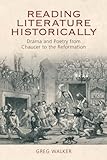Reading Literature Historically : Drama and Poetry from Chaucer to the Reformation / Greg Walker.
Material type: TextPublisher: Edinburgh : Edinburgh University Press, [2022]Copyright date: ©2013Description: 1 online resource (216 p.)Content type:
TextPublisher: Edinburgh : Edinburgh University Press, [2022]Copyright date: ©2013Description: 1 online resource (216 p.)Content type: - 9780748681013
- 9780748681020
- English drama -- Early modern and Elizabethan, 1500-1600 -- History and criticism
- English drama -- To 1500 -- History and criticism
- English poetry -- Early modern, 1500-1700 -- History and criticism
- English poetry -- Middle English, 1100-1500 -- History and criticism
- Historicism in literature
- Literary Studies
- LITERARY CRITICISM / European / English, Irish, Scottish, Welsh
- 820.9003 23
- PR149.H57 W35 2013
- online - DeGruyter
| Item type | Current library | Call number | URL | Status | Notes | Barcode | |
|---|---|---|---|---|---|---|---|
 eBook
eBook
|
Biblioteca "Angelicum" Pont. Univ. S.Tommaso d'Aquino Nuvola online | online - DeGruyter (Browse shelf(Opens below)) | Online access | Not for loan (Accesso limitato) | Accesso per gli utenti autorizzati / Access for authorized users | (dgr)9780748681020 |
Browsing Biblioteca "Angelicum" Pont. Univ. S.Tommaso d'Aquino shelves, Shelving location: Nuvola online Close shelf browser (Hides shelf browser)

|

|

|

|

|

|

|
||
| online - DeGruyter Just War Theory : A Reappraisal / | online - DeGruyter The Ethics of Peace and War / | online - DeGruyter Derrida and Other Animals : The Boundaries of the Human / | online - DeGruyter Reading Literature Historically : Drama and Poetry from Chaucer to the Reformation / | online - DeGruyter Material Inscriptions : Rhetorical Reading in Practice and Theory / | online - DeGruyter Ideology, Rhetoric, Aesthetics : For de Man / | online - DeGruyter Letter Writing Among Poets : From William Wordsworth to Elizabeth Bishop / |
Frontmatter -- Contents -- Acknowledgements -- Introduction: Literature and History: The Risks of Conversation -- Part I: Drama -- 1 Early Tudor Drama and the Arts of Resistance -- 2 ‘To Speak before the King, it is no Child’s Play’: Godly Queen Hester in 1529 -- 3 Flytyng in the Face of Convention: Protest and Innovation in Lindsay’s Satyre of the Thrie Estaitis -- Part II: Poetry, 1380–1532 -- 4 Courtesy and Chivalry in Sir Gawain and the Green Knight -- 5 The Plowman’s Tale and the Politics of 1532: A Cautionary Tale? -- 6 Rough Girls and Squeamish Boys: The Trouble with Absolon in The Miller’s Tale -- Index
restricted access online access with authorization star
http://purl.org/coar/access_right/c_16ec
Pioneer of early-modern literary historicism reads Medieval & early Tudor drama & poetry historicallyHow far should we try to read medieval and early modern texts historically? Does the attempt to uncover how such texts might have been received by their original readers and audiences uncover new, hitherto unexpected contemporary resonances in them? Or does it flatten works of art into mere ‘secondary sources’ for historical analysis? This book makes the case for the study of literature in context. It demonstrates the value of historical and cultural analysis alongside traditional literary scholarship for enriching our understanding of plays and poems from the medieval and early Tudor past and of the cultures which produced and received them. It equally accepts the risks involved in that kind of study.Key FeaturesMakes the case for reading medieval and early Tudor literature historicallyCase studies of the interaction between literature and politics, from Chaucer to the reign of Henry VIIIDetailed analysis of key medieval and Renaissance texts, Chaucer’s Miller’s Tale, Sir Gawain and Green Knight, Sir David Lyndsay’s A Satire of the Three EstatesTurns a spotlight on hitherto neglected texts that reveal the challenges, rewards and potential pitfalls of reading literature historically
Mode of access: Internet via World Wide Web.
In English.
Description based on online resource; title from PDF title page (publisher's Web site, viewed 29. Jun 2022)


